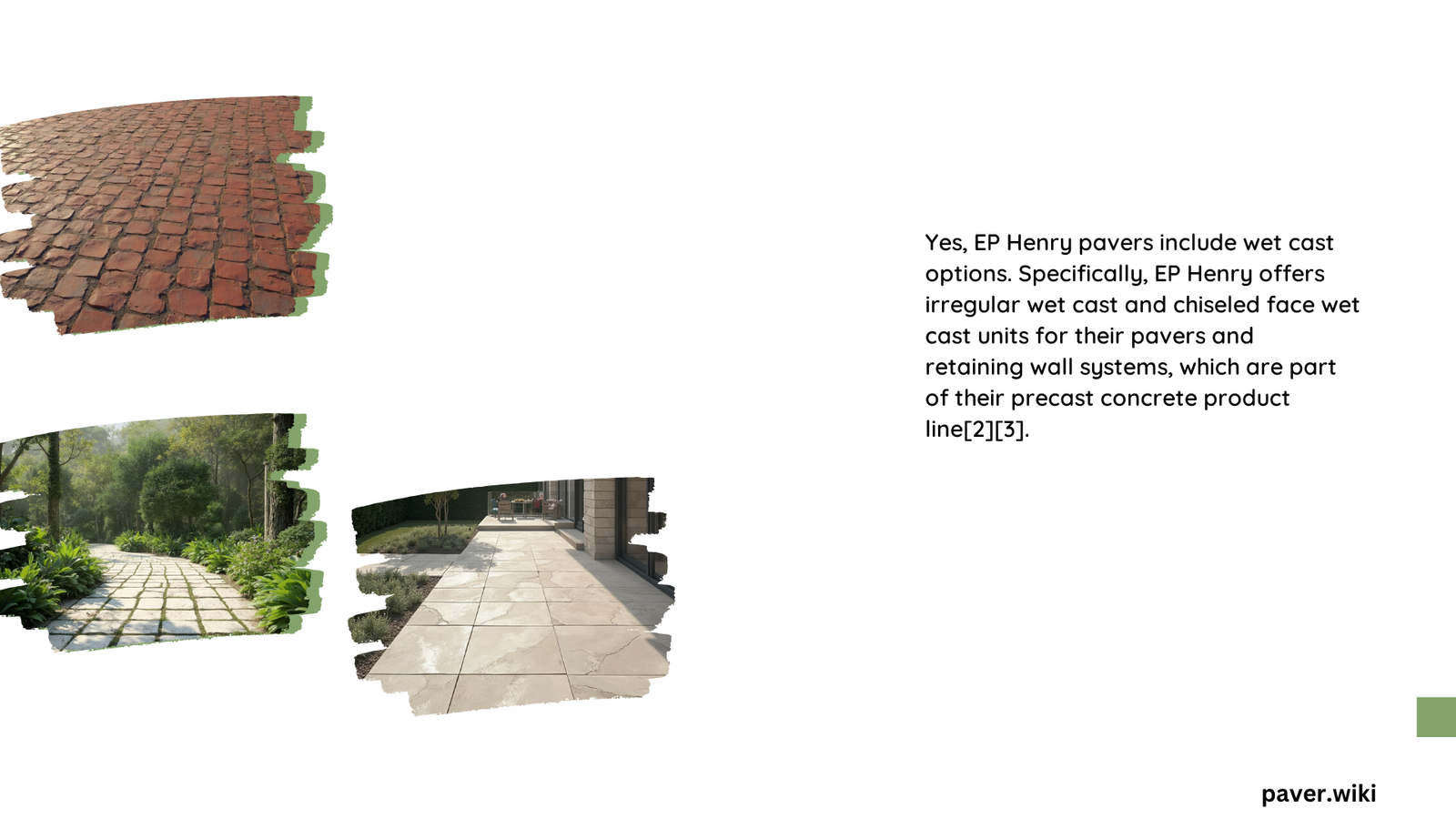EP Henry pavers are indeed wet cast made. The manufacturing process involves preparing a mixture of cement, aggregates, water, and additives, which is then poured into molds and vibrated to remove air pockets. The pavers are cured in a controlled environment, resulting in dense and durable products. EP Henry has implemented automation in their wet cast manufacturing process, particularly for products like cornerstones, to improve efficiency and reduce waste.
What is the Manufacturing Process of EP Henry Wet Cast Pavers?
The manufacturing process of EP Henry wet cast pavers involves several key steps:
- Material Preparation: A mixture of cement, aggregates (sand and stones), water, and additives is prepared.
- Molding: The wet mixture is poured into molds.
- Vibration: Molds are vibrated to remove air pockets and ensure even distribution.
- Curing: Pavers are cured in a controlled environment for proper setting and hardening.
- Automation: EP Henry has integrated automated processes, especially for products like cornerstones.
What Materials are Used in EP Henry Wet Cast Pavers?

While exact percentages are not publicly available, EP Henry wet cast pavers typically contain:
- Portland cement
- Aggregates (sand and stones)
- Water
- Chemical additives (for enhanced properties)
The specific composition may vary depending on the product line and intended use.
How Durable are EP Henry Wet Cast Pavers?
EP Henry wet cast pavers are known for their durability and longevity. Here are some key aspects of their durability:
- Freeze-Thaw Resistance: Excellent resistance to freeze-thaw cycles due to their dense structure.
- Compressive Strength: While specific values for EP Henry pavers are not provided, wet cast pavers generally have high compressive strength, often ranging from 8,000 to 12,000 psi.
- Lifespan: Under normal conditions, wet cast pavers can last 20-30 years or more.
What are the Performance Metrics of EP Henry Wet Cast Pavers?
EP Henry wet cast pavers are designed to perform well in various conditions:
- Traffic Load: Suitable for heavy traffic areas
- Weather Resistance: Designed to withstand various environmental conditions
- Aesthetic Longevity: Maintain appearance over time
While specific performance metrics are not publicly available, EP Henry pavers are likely to meet or exceed industry standards set by organizations like the Interlocking Concrete Pavement Institute (ICPI) and the American Society for Testing and Materials (ASTM).
How Does EP Henry’s Wet Cast Process Compare to Other Methods?
EP Henry’s wet cast process offers several advantages over other paver manufacturing methods:
- Density: Wet cast pavers are typically denser than dry cast alternatives.
- Customization: The wet cast process allows for more intricate designs and textures.
- Strength: Generally higher strength compared to dry cast pavers.
- Consistency: Automated processes ensure consistent quality across batches.
| Feature | Wet Cast (EP Henry) | Dry Cast |
|---|---|---|
| Density | Higher | Lower |
| Design Flexibility | More intricate | Limited |
| Strength | Generally higher | Variable |
| Production Speed | Slower | Faster |
What Innovations Has EP Henry Introduced in Wet Cast Paver Manufacturing?
EP Henry has implemented several innovations in their wet cast paver manufacturing process:
- Automation: Introduced automated systems for products like cornerstones, reducing labor intensity and waste.
- Efficiency Improvements: Streamlined production processes to increase output and reduce costs.
- Quality Control: Implemented advanced quality control measures throughout the manufacturing process.
These innovations have allowed EP Henry to maintain high-quality standards while improving production efficiency.
How Does EP Henry Ensure Quality in Their Wet Cast Pavers?
EP Henry employs several methods to ensure the quality of their wet cast pavers:
- Material Selection: Careful selection and testing of raw materials.
- Process Control: Automated and monitored manufacturing processes.
- Curing Conditions: Controlled curing environment for optimal strength development.
- Testing: Regular testing of finished products for strength, durability, and appearance.
- Quality Assurance: Adherence to industry standards and internal quality control measures.
While specific testing protocols are not publicly detailed, EP Henry likely follows industry-standard testing procedures to ensure their pavers meet or exceed required specifications.
What are the Environmental Considerations in EP Henry’s Wet Cast Paver Production?
EP Henry has taken steps to make their wet cast paver production more environmentally friendly:
- Resource Efficiency: Automation has reduced waste in the production process.
- Durability: The long lifespan of wet cast pavers reduces the need for frequent replacement.
- Local Sourcing: Where possible, materials are likely sourced locally to reduce transportation emissions.
However, detailed information about specific environmental initiatives or certifications for their wet cast paver production is not provided in the available sources.
How Do EP Henry Wet Cast Pavers Contribute to Sustainable Landscaping?
EP Henry wet cast pavers can contribute to sustainable landscaping in several ways:
- Longevity: Their durability reduces the need for frequent replacement, conserving resources over time.
- Permeability: Some EP Henry paver designs may allow for water infiltration, reducing runoff.
- Heat Reflection: Lighter colored pavers can help reduce the urban heat island effect.
- Recyclability: At the end of their lifecycle, concrete pavers can often be recycled into aggregate for new construction projects.
While specific sustainability features of EP Henry pavers are not detailed in the sources, these are common benefits associated with high-quality wet cast pavers.
References:
1. Wet cast innovator cuts costs and increases output with cornerstone automation
2. Solidia – The Process Simplified – EP Henry
3. EP Henry Retaining Walls – Norristown Brick
